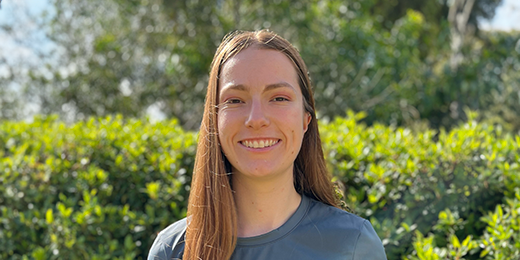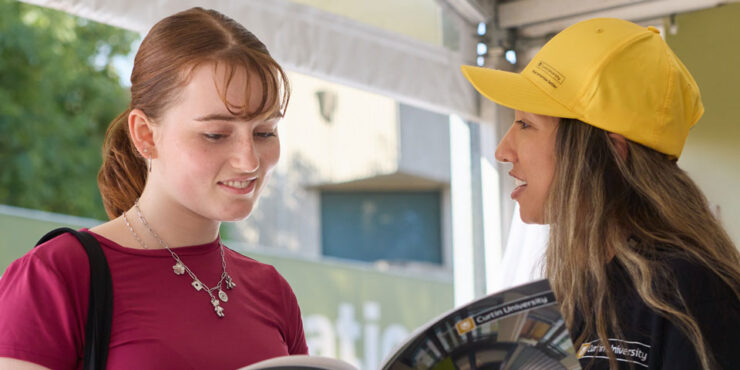Course overview
Learn about the pathology of disease – its origin, nature and course – and diagnosis.
Through this course, you’ll gain the knowledge and skills to launch your career as a professional medical laboratory scientist.
Career outcomes
Jobs for medical scientists in Australia are expected to grow by almost 23% by 2034.¹
Careers
- Medical scientist
Industries
- Community health
- Education
- Health technology
- Healthcare
- Research and development
¹ Source: Jobs and Skills Australia – Employment Projections.
Professional accreditation and recognition
This course is accredited by the Australian Institute of Medical and Clinical Scientists.
Why study at Curtin?
Work experience
You’ll develop your practical skills in a 24-week professional placement in a diagnostic pathology laboratory.
Industry links
In Curtin’s PC2 lab, you’ll process and analyse clinical samples, identify microbes and report results as done by a professional laboratory.
Specialist pathways
You can choose to focus on three of these disciplines: anatomical pathology, haematology and transfusion science, clinical biochemistry, immunology, medical microbiology.
Hear from our students

"The skills I’ve gained from my course include setting up and interpreting test results, communicating clearly with other health professionals, and using the correct scientific procedures and methods. We’re taught to be well-rounded scientists who can think outside the box."
Taylor Throssell
Bachelor of Science (Laboratory Medicine)
Your student experience

Work-integrated learning at Curtin: explore a Universe of opportunity
Develop real-world experience before you graduate. Learn how work-integrated learning helps you build career skills and connect with industry early.

Thinking about uni? Five reasons Curtin could be your best move
Not sure if uni is for you? Explore five clear reasons students choose Curtin – from flexible pathways and support to real-world skills and outcomes.

Find your entry pathway to Curtin
You may be finishing high school, coming from TAFE, or just thinking of a career change; but whatever your background, there’s an entry pathway to Curtin for you.
Upcoming events

29 March 2026
Curtin Open Day
Curtin Perth
Discover where in the world a Curtin Degree can take you at Curtin Open Day. Explore courses that connect with industry, meet people who can guide your career direction and see how your ideas can become a reality.
Course structure
What you’ll learn
In your first year, you will study interprofessional health units with students from other health science disciplines.
In your second year, you’ll focus on your discipline, learning the cellular and tissue aspects of pathology and the various areas of laboratory medicine.
You’ll then focus on your choice of three of these five fields: anatomical pathology, clinical biochemistry, immunology, medical microbiology, and haematology and transfusion science.
Practical experience
You’ll gain extensive practical experience in Curtin’s purpose-built Physical Containment Level 2 Laboratory. Here, you’ll process and analyse clinical samples, identify microbes and report results as done by a professional laboratory.
You’ll further develop your practical skills during a 24-week placement at a diagnostic pathology laboratory.
Detailed course structure and unit information
For detailed information and course structure, visit our Handbook.
Entry requirements
To study this course, you must meet the entry criteria:
- course ATAR, or equivalent, demonstrated via an accepted entry pathway
- any course-specific requirements
- English language requirement.
Minimum ATAR entry required
This course requires you to achieve a minimum ATAR/selection rank to be considered for entry, but does not guarantee selection.
Entry pathways
There are different ways to meet our academic entry requirements. Choose the option that best suits the highest level of education that you’ve achieved.
Curious how students entered this course? See the entry pathways other students have taken.
Course-specific requirements
You’ll also need to meet any specific requirements to be eligible to apply for this course.
Study credit and support
You may be able to receive study credit or support based on your previous experience or personal circumstances.
Get credit towards your degree
You may be able to receive credit for recognised learning (CRL) from past study or professional experience, which could reduce the time it takes to finish your course.
Find specific details about CRL for this course on the Handbook.
Special consideration
If your studies were affected by circumstances beyond your control, you may be eligible for special consideration when applying to Curtin. This process is available to new applicants only and allows your application to be assessed in light of those circumstances.
Additional information
Notes about this course
Make sure you check the course notes for any other important information.
Fees
2026 Domestic indicative fees
*The indicative first-year fee is based on a standard full-time study load of 200 credit points.
This fee is a guide only. Your total fee may vary depending on the units you choose, your study load or if your course includes additional requirements. For more information on fees, see other fees and charges.
Scholarships
Get the support you need to succeed with our diverse range of scholarships. Whether it’s financial support, assistance with relocation, or recognition for your academic achievements, we have scholarships tailored to your unique needs.
How to apply
Follow these steps to make sure you’re eligible, prepared and ready to apply for your course.
Check entry requirements
Entry requirements differ by course and your previous work and study experience.
Prepare your documents
The documents you need may vary depending on your course and application pathway.
Check application deadlines
Deadlines vary by course and whether you’re applying as a domestic or international student.
Choose your application pathway
I’m in year 12 or applying for Medicine
If you’re in year 12 or recently finished high school, you’ll need to apply through TISC.
You’ll apply through TISC no matter what you studied in high school, whether that was:
- ATAR
- General subjects
- Certificate IV
- or completing UniReady in Schools program.
TISC has different application dates to Curtin. Visit the TISC website for all important dates, including application deadlines.
I have finished high school
If you’re not a current year 12 student or recent graduate, you’re considered a non school leaver and you’ll apply directly to Curtin.
The only exception is Medicine, which must be applied for through TISC.
You’ll apply directly to Curtin if you are:
- a high school graduate who finished school last year or earlier
- transferring from another university
- returning to study or using your professional experience to qualify
- progressing from a VET or TAFE qualification or bridging program
- a current Curtin student changing courses or campuses.
Application deadlines can vary by course. Make sure to check application deadlines before you apply.
Express your interestExplore more
Find more resources to help you take the next step in your Curtin journey.